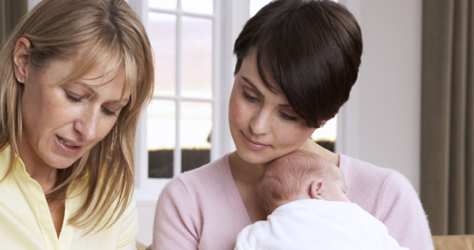What is postnatal depression?
You have a beautiful new baby, you’re beginning to feel better after the birth, so why are you feeling so low and crying for no apparent reason?
These feelings are really common, especially in the first few days after the birth – they’re probably just the baby blues, and they’ll pass in a few days once your hormones stabilise.
At a glance
- Sometimes there’s an obvious reason for PND, but not always. It can happen to anyone
- Doctors say you’re more likely to get PND if you’ve had depression before, you had depression or anxiety during pregnancy
- The good news is that PND is very treatable. And by recognising you might have a problem, you’ve taken the first important step to sorting it out

But if you’re still feeling really low after two weeks or more, then you may need extra support from your health visitor or GP.
What are the symptoms of postnatal depression?
If you’re feeling some or all of the following symptoms, then you may have postnatal depression, according to the Royal College of Psychiatrists:
- You feel low, unhappy or tearful for much of the time, and worse at certain times of the day, like mornings or evenings
- You’re irritable or angry with your partner or other children
- You feel more than tired – utterly exhausted and lacking in energy
- You can’t sleep despite the exhaustion, and lie awake at night even when your baby is asleep. You may wake very early in the morning, before your baby.
- You lose your appetite and forget to eat
- You can’t seem to enjoy anything, even being with your baby
- You lose any interest in sex
- Simple everyday tasks become a problem
- You have negative thoughts – that you’re not a good mother and your baby doesn’t love you – and you feel guilty for thinking that. You lose confidence and feel you can’t cope
- Your anxiety is overwhelming – you worry that your baby is ill, not putting on enough weight or may have stopped breathing. You might worry you are ill or might harm your baby. When you’re anxious you might have a racing pulse, thumping heart, breathlessness, sweatiness and a fear of collapse or heart attack
- You’re avoiding other people: not going to postnatal groups or seeing friends and family
- You feel hopeless and that things will never get better, even that your family might be better off without you
If what you’re feeling turns out to be postnatal depression, you’re not alone. PND affects between 10 and 15 of every 100 mums and it’s absolutely nothing to be ashamed of, even though lots of mums feel they need to hide it by putting on their ‘happy mask’.
Why am I experiencing postnatal depression?
Sometimes there’s an obvious reason for PND, but not always. It can happen to anyone.
Doctors say you’re more likely to get PND if you’ve had depression before, you had depression or anxiety during pregnancy, you don’t have much support from family or friends or you’ve suffered a recent stressful event such as a death or job loss. Sometimes a birth can stir up emotions from your past you’ve never fully dealt with, like the loss or death of a parent.
PND often starts within 1-2 months after the birth, but can also start later. For a third of women with PND, their symptoms actually started in pregnancy.
The good news is that PND is very treatable. And by recognising you might have a problem, you’ve taken the first important step to sorting it out.